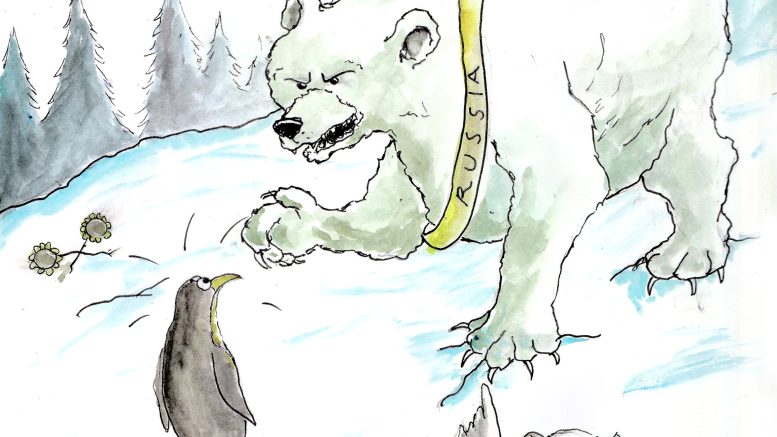Russia’s invasion of Ukraine is one of the largest military conflicts in Europe since the Second World War. By ordering an unprovoked attack on a country much smaller than his own, Vladimir Putin has placed millions of lives at risk. Putin’s motive for the harassment of Ukraine has been the subject of substantial speculation since he annexed Crimea in 2014, but his track record as president of Russia displays a pattern of corruption and lack of compassion toward human life that reflects the values of his regime.
The Russian government has not gone unpunished for its recent actions.
Leaders around the world have placed various sanctions on the Russian economy that have devastated its position in global trade and slowed its military’s advance. The sale of Russian gas and coal has been restricted in the largest European markets, the United States has blocked the export of American-developed technology to Russia and Russia’s richest oligarchs have had their international bank accounts frozen. Belarus has also faced similar sanctions for aiding Russia’s invasion of Ukraine.
Members of NATO have placed troops in countries neighbouring Ukraine as a show of support and to deter Russia from further attacks on European nations.
General Motors, Shell and Apple are among the private corporations that have refused to do business with Russia.
Western governments and enterprises have demonstrated they will not stand with Putin and his government’s tyrannical actions. Further, solidarity with Ukraine can be seen in a variety of public spaces, including social media, community centres and college campuses.
In the sporting world, international organizations like FIFA, the Union of European Football Associations and the International Ice Hockey Federation as well as domestic western leagues like the NHL and NBA have cut ties with Russia and banned members from competing with and against organizations within the country.
These organizations all stand to lose a great deal of revenue from cutting ties with Russia. The immediate cost of cancelled events will hurt teams and organizations in the short term and in the future. A whole generation of Russians will certainly be impacted by the inability to watch their teams compete, cutting out a large chunk of the immediate sporting market in Russia and stalling the development of fanbases for years to come.
However, this could also be said for Ukraine, where sports are now the last thing on the minds of civilians seeking safety.
Due to Russia’s invasion, Ukrainian athletics will now certainly be set back for years. The international sporting community’s decision to cut ties with Russia was the correct response.
Not only was it the right move morally for associations that oppose Russian aggression, but politically as well. These athletic institutions are deeply embedded in the culture of the nations they operate in. In an era where the movements and decisions of public figures are constantly analyzed under a microscope, having a passive stance on a crisis with the magnitude of this invasion could be detrimental.
Although the actions of these sporting associations will undoubtedly hurt their bottom line, the decision not to associate with any organizations under Russian influence could benefit their public image and relations. Cutting ties with Russian associations signals to critics that these international leagues and associations share similar values to their consumers, increasing support for them going forward.
For this reason, it should come as no surprise that these organizations took such a severe stance on Russia’s aggression. However, this position should be taken with other conflicts as well. Unfortunately, there have been numerous humanitarian crises that have not received a similar response from organizations like the Olympics and FIFA.
Since 2017, the persecution and killing of Rohingya Muslims by the Myanmar military has resulted in the displacement of nearly a million people and hundreds of thousands being placed in detention camps. Fuelled by Islamophobia, the death toll of Rohingya Muslims is in the tens of thousands.
In Yemen, millions of citizens suffer from malnutrition and displacement due to the ongoing proxy war between Iran and the U.S.-backed Saudi Arabian military. This conflict has been described as one of the world’s largest humanitarian crises.
These catastrophes are only a small sample of state-sponsored violence that have put millions of innocent people in danger.
Unlike Russia’s invasion, these issues have gone largely unnoticed in the sporting world.
Myanmar, Saudi Arabia and Iran all competed in the 2020 Tokyo Olympic Games and are all currently playing qualifying matches for the upcoming 2022 FIFA World Cup in Qatar.
The west’s role in these conflicts have not been acknowledged, either.
During this year’s Winter Olympics in China, accusations of crimes against humanity inflicted on the Uyghur people by the host country were discussed by governments and human rights groups around the world, but the games went forward nonetheless.
Sporting organizations should treat these countries in the same fashion as they did Russia. Conflicts in marginalized nations deserve the same amount of attention as those in Europe and should be addressed with equal passion. Unfortunately, the last few weeks of war in Ukraine has already received more media attention than the last eight years of war in Yemen.
By not treating these issues equally, sporting groups demonstrate the lack of concern they have for racialized people. Those who are complicit in murdering the innocent and pursuing wars of conquest have zero place in athletics. It is time that the Olympics, FIFA and the rest of the sporting world take a stand against large-scale violence. If nations forge a path of destruction and division, they should not be permitted to participate in the unifying nature of sports.



